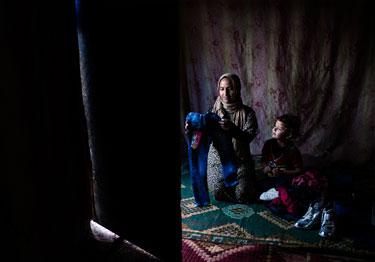
For refugee families like the Muhannads huddling against the winter in makeshift shelters that barely protect them from the elements in Bekaa Valley, Lebanon, cash assistance will go a long way towards finding some warmth.
Once upon a time, in a small tent of tarpaulin stretched across wooden mattress frames, Tamara told her version of an old fairy tale. “I had also lost my shoes, but not because I had to leave them behind for a prince to find me. And that spell only lasted until midnight,” she says.
“Last night, in order to heat up our tent, I was forced to burn them.”
Shelter against the cold
Tamara is 13 years old, and her family shelter in the Bekaa Valley, in Lebanon. With the temperatures plummeting to below 0° C in parts of Lebanon, she is among the more than half a million vulnerable refugee children living in informal tent settlements, or in host communities, who are facing severe hardship.
Abu Muhannad is father to Tamara and her seven siblings. The family lived in a suburb of Damascus, in the Syrian Arab Republic. They fled when their neighbourhood came under fire, three years ago, and they have been living in this tent camp for a year. Now, the family struggle to keep warm in this makeshift shelter that does not protect them from the elements. “Last night, I woke up because of the cold,” he says. “My children were clinching to each other in their sleep, trying to get warm, so I covered them with my blanket.”
Cash assistance
“To this day, one in five refugees in Lebanon are living in an open field or an unfinished building, living conditions that are inadequate and pose a great health risk to children,” says UNICEF Deputy Representative in Lebanon Luciano Calestini. “For them, getting by through winter is a matter of life and death.”
To meet the needs of families like Tamara’s, UNICEF runs a cash assistance programme. Through the programme, every child below the age of 15 living in an informal tent settlement, as well as the most vulnerable Lebanese and Palestinian children, is entitled to US$40. This winter, the caregivers of more than 200,000 Syrian, Lebanese and Palestinian children have received a debit card. They can withdraw the money and use it on what they find is most important for their child
“This way, people have the freedom to choose themselves how to spend the cash, deciding what their biggest needs are,” explains Mr. Calestini.
Warm clothes
Abu Muhannad and his wife Umm Muhannad are among the caregivers who have received a debit card. Regardless of the living conditions and the hardship, says Abu Muhannad, a parent still wants to be able to provide his child with warm clothes for winter. Their oldest has worn the same set of clothes for the past two years.
So, the family have prioritized winter clothing above all. Seven of the siblings now have new clothes. The youngest, Ibrahim, has to do with his older brother’s used clothes, says Umm Muhannad.
Maria, 14, decided to visit a small shopping centre before the family received their debit card. She was ready for the “big shopping day”. “I found a dark blue shirt – it’s a colour that I love,” she says.
She and her mother would pick a less expensive shirt that she liked – yellow, with glitter, from a seller who serves the tent settlements in the area. ”Children will always think their parents can do anything for them,” says Umm Muhannad. “But in our case, we simply cannot.”
By Razan Rashidi
Unicef.org
 FR
FR EN
EN AR
AR








